Section 336 is the reason why today’s model-aircraft and drone fliers have been able to fly without a Federal Aviation Administration (FAA) pilot’s license, equipage mandates, and regulatory paperwork. Section 336 is a safe tradition that has been around for many decades. If you like flying your model aircraft for recreation without mandates that include pilot licenses and remote IDs, action is needed now.

Who Would Do This?
The efforts to repeal are coming from various sources—to name a few, Google’s Project Wing, CNN, and Ford. All these companies are members of the Commercial Drone Alliance. This group issued a press release on April 4, 2018, stating, “Legislation is necessary now to allow the FAA to properly regulate hobbyist drone operations under a revised Part 107 of the Federal Aviation Regulations.” Lisa Ellman, co-executive director of the Commercial Drone Alliance, says, “We understand why model aircraft proponents want to remain exempt, as they have been flying safely for decades. However, times have changed, and hobbyists are no longer flying alone.” These commercial drone companies apparently wish to repeal Section 336 and replace it with restrictions that include pilot licenses and remote IDs for hobby pilots to free up airspace for large commercial drone operations.
In my experience with model aircraft and drones, I have found many people in STEM (Science, Technology, Engineering, and Math) and careers in aviation started out as Section 336 recreational fliers of model aircraft. In addition, many of these same professionals continue to fly their model aircraft as an enjoyable hobby.
هذه القصة مأخوذة من طبعة October 2018 من Model Airplane News.
ابدأ النسخة التجريبية المجانية من Magzter GOLD لمدة 7 أيام للوصول إلى آلاف القصص المتميزة المنسقة وأكثر من 9,000 مجلة وصحيفة.
بالفعل مشترك ? تسجيل الدخول
هذه القصة مأخوذة من طبعة October 2018 من Model Airplane News.
ابدأ النسخة التجريبية المجانية من Magzter GOLD لمدة 7 أيام للوصول إلى آلاف القصص المتميزة المنسقة وأكثر من 9,000 مجلة وصحيفة.
بالفعل مشترك? تسجيل الدخول
Legend Hobby / Seagull Models - Cessna Grand Caravan 208
The Cessna Grand Caravan 208 is a legend in aviation circles. A single engine utility aircraft that punches up with capabilities that rival many twin engine aircraft in its class. Its seemingly simple configuration belies its near extreme utility.
PROPER CG LOCATION FOR AEROBATICS
If you are getting into aerobatics and are starting to perform more advanced maneuvers, it is time to discuss ways you can not only become a better pilot, but how you can also improve the flight characteristics of your airplanes.
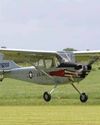
Legend Hobby 13-Foot L-19 Bird Dog/ Cessna O-1
This famous multi-mission single engine observation aircraft served from 1950-1974. From calling out target locations to providing intel/recon information, the Bird Dog was a valued asset in both the Korean War and Vietnam.
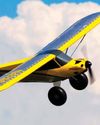
EARN YOUR WINGS
10 Tips for First-Flight Success
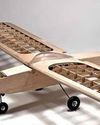
Old School Model Works Fifty Six
The Fifty Six takes its design cues from the original .09- to .15-size Carl Goldberg Falcon 56 of the 1960s. Reworked to incorporate modern, lasercut techniques to make kit building better than ever.
FLYING TWINS Multi-engine warbirds made easy
Let’s face it, there’s just something extra special about twin-engine RC aircraft. Most modelers stop what they’re doing when a twin fires up on the flightline.
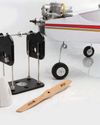
HOW TO BALANCE PROPELLERS
Four easy steps to increase performance and reduce vibration
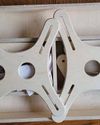
PRODUCT REVIEW: RC PLANE STANDS BENCHTOP MODEL
I’m a sucker for shop stuff. I buy tools I will probably never use just because they are cool, or I might need to use them someday. When Glen from RC Plane Stands reached out about a review, however, I knew as soon as I browsed their website that I would be receiving something I would use a lot, maybe even daily.
SPIRIT OF RHINEBECK AWARD WINNER
A close up of Norman Malinowski’s 1/3-scale Albatros
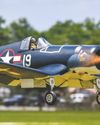
CENTER OF GRAVITY BASICS
The secret to a plane that flies well